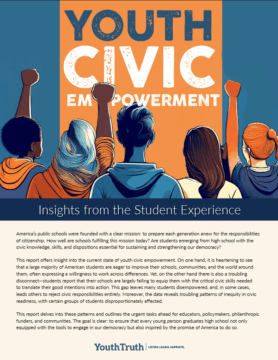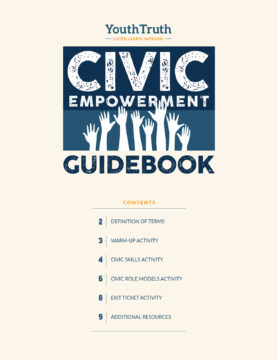Youth Civic Empowerment: Insights from the Student Experience
Overview
How well are public schools preparing students for civic engagement and democratic responsibilities? While many students express a strong desire to improve their communities and work across differences, there is a concerning gap: schools are often not providing the critical civic skills necessary for students to turn these intentions into action. This disconnect can lead to disempowerment or even a rejection of civic duties. Additionally, there are significant inequities in civic readiness, with some groups of students being disproportionately affected. This report calls for urgent action from educators, policymakers, funders, and communities to ensure that all students graduate with both the skills and inspiration to participate in democracy.

America’s public schools were founded with a clear mission: to prepare each generation anew for the responsibilities of citizenship. How well are schools fulfilling this mission today? Are students emerging from high school with the civic knowledge, skills, and dispositions essential for sustaining and strengthening our democracy?
This report offers insight into the current state of youth civic empowerment. On one hand, it is heartening to see that a large majority of American students are eager to improve their schools, communities, and the world around them, often expressing a willingness to work across differences. Yet, on the other hand there is also a troubling disconnect—students report that their schools are largely failing to equip them with the critical civic skills needed to translate their good intentions into action. This gap leaves many students disempowered, and, in some cases, leads others to reject civic responsibilities entirely. Moreover, the data reveals troubling patterns of inequity in civic readiness, with certain groups of students disproportionately affected.
This report delves into these patterns and outlines the urgent tasks ahead for educators, policymakers, philanthropic funders, and communities. The goal is clear: to ensure that every young person graduates high school not only equipped with the tools to engage in our democracy but also inspired by the promise of America to do so.
-

Finding 1: Strong Civic Dispositions but Skills Lacking
Most high school students want to help others and work across differences to improve society. However, fewer than half report learning the necessary civic skills in school, and fewer than a third have been empowered to create positive change in their communities.
-

Finding 2: Inequitable Civic Preparedness
Civic readiness is uneven among high school students. Those with parents holding advanced degrees stand out as most civically prepared, while Hispanic/Latinx students are significantly less civically empowered than other racial groups.
-

Finding 3: Only Half Agree Voting Matters and Demographics Highlight Civic Disparities
Overall, 53 percent of high school students believe that voting is important. School size and location do not significantly affect students’ belief in the importance of voting. However, significant differences in this belief exist based on student demographics.
-

Finding 4: Civic Engagement Thrives in Extracurriculars Despite Academic Disconnect
Students describe academic work as disconnected from public life and a barrier to civic engagement, but they find participation in clubs, activities, and sports teams civically empowering.
Civic Empowerment Survey Items Overall Response Distributions
Helping others is important to me.
It is important to work with people with backgrounds and experiences that are different from mine.
Being actively involved in national, state, or local issues is important to me.
In school I have learned how to evaluate the evidence that backs up people’s opinions.
I can make a difference in my school, my community, or the world.
In school I have learned how to make my school, my community, or the world a better place.
It is important to vote.
I work with others to solve problems in my school or community.
I have helped change things for the better in my school, my community, or the world.
- Strongly Disagree/Disagree
- Neither Agree nor disagree
- Strongly Agree/Agree

Guidebook
Civic Empowerment Guidebook
September 2024
This resource was created to support educators and others in empowering and inspiring young people to become active, engaged citizens. This guidebook complements the YouthTruth research report, Youth Civic Empowerment: Insights from the Student Experience.
